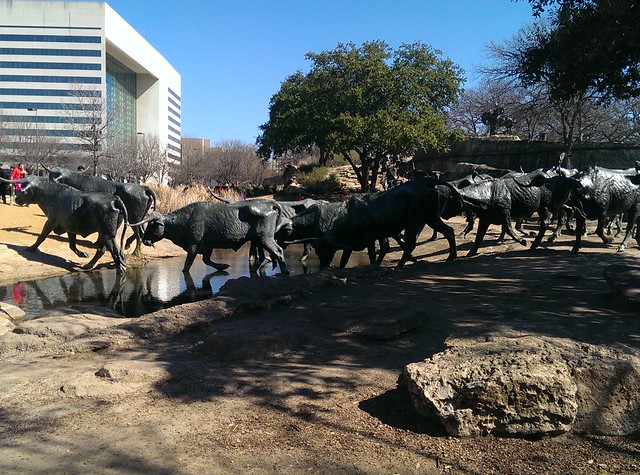This was the third Annual conference I have attended, and my last as ACRL Liaison to the National Resource Center for the First-Year Experience and Students in Transition, the sponsoring group. This year’s conference was held in downtown Dallas, Texas.
This was the best coffee I found. It was very good.

Cattle drive art in Pioneer Plaza, next to the conference hotel
I facilitated a discussion on the new ACRL Framework for Information Literacy for Higher Education on the last day of the conference, but I forgot to take a picture of the room. In small groups, we focused on designing course and class activities.
Here’s the handout summarizing the Framework (PDF on Google Drive)
Group 1’s Daily Show activity.
Group 2’s first-year seminar focused syllabus investigation activity.
Group 3’s 21 Questions activity.
The conference never has a specific theme limiting the scope of the presentations, so there’s a wide range of talks, posters, workshops and discussions focusing on all kinds of issues of interest to those who work with first-year students. The attendees are teachers, students, student affairs professionals, program administrators, institutional administrators and more. Some sessions are designated as research-focused, while others synthesize information on rising trends. A few things I took away from this conference:
- Common Reading Programs are still a very important part of the first-year experience on many campuses. There is a significant publisher presence on the vendor floor at the FYE conference, and it’s clear that these programs have become a major industry. There were Common Reading sessions in every timeslot – some examining program logistics, and others focused on effective ways to build supplementary programs around the common book. I did not attend many of these sessions, but it is also clear that there is still not a lot of assessment data about the impact of these programs.
- Peer Leaders and peer-to-peer learning is a major theme. There were sessions on training, recruiting and working with peer leaders in a variety of contexts (including one from librarians at the University of Nevada at Las Vegas, who brought some of their peer leaders as co-presenters).
- Financial literacy is an increasingly important topic. Always a part of the conversation, there were more standalone sessions on this topic than I remember before. In addition, there were more products and services on the vendor floor focused on this area. Given that this was also a priority for ACRL in recent years, there is an interesting point of convergence there.
- Many of the sessions continue to be focused on the logistics of creating, implementing and running specific programs: orientations, seminars, bridge programs, etc. There are always a significant population of FYE administrators who attend this conference, and a noticeable group of faculty members recently tasked with building FYE programs.
- First-year study abroad programs continue to grow. There are a few schools with long-established programs, but many of the programs presenting here were created in the last few years. There were no library-specific examples of these, but in out of session conversations I met multiple librarians who have partnered with FYE trips abroad. Here’s some sample programs:
- There is also a sizable group of faculty who teach in FYE programs who attend this conference and as a result, there are always sessions focused on pedagogy and teaching practice. Two of the sessions I attended illustrate the diversity of approaches you can find in these sessions:
- I finally got to Christine Harrington’s session on designing effective syllabi. Versions of this have been offered in previous FYE conferences and it’s always SRO. This year was no exception. Well worth the early arrival.
- Utah State faculty presented on their new, academic approach to FYE focused on the message: Becoming a Learner. This session was also SRO, which I think surprised the presenters. Here’s a sampling of some of the related videos they use in this program.
- I had worried that the library and information literacy sessions would be down this year because of ACRL, but that was not the case. There were a variety of sessions focused on information literacy and inquiry. Librarians talked about their collaborations with First-Year Seminars and Common Reading programs and new student orientations. They discussed student publishing and Open Textbook projects. Attendees learned about Kansas State’s library-created Alternate Reality Game, and the University of Toronto’s Personal Librarian program.

